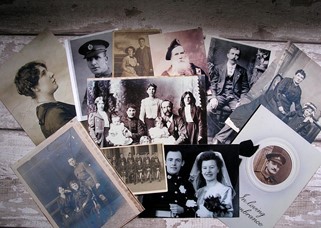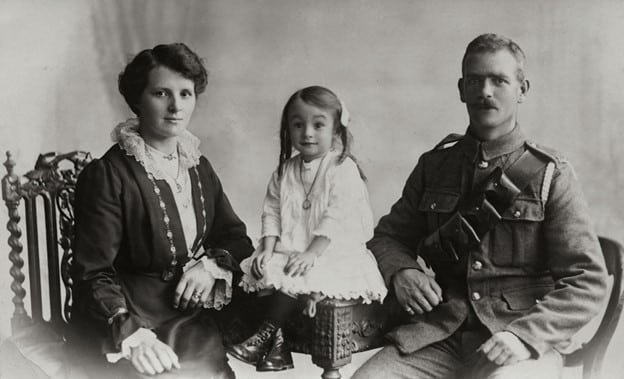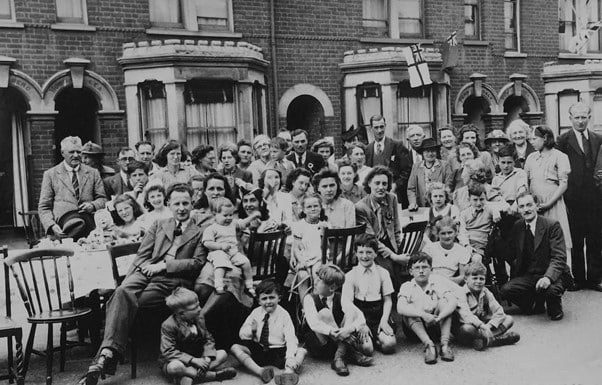
10 Things to Consider When Writing a Family History Book
10 THINGS TO CONSIDER WHEN WRITING A FAMILY HISTORY BOOK
“We all carry inside us, people who came before us.” — Liam Callanan
Writing a family history book is an endeavor rooted in love and admiration.
Choosing to chronicle a family history is about honoring beloved ancestors, and giving a voice to those who may no longer be around to share their story.
Crafting a family history book requires a combination of skill and dedication. And sometimes those skills may be beyond the ability and availability of the interested parties.
Before setting out with a project like this, there are 10 important factors to keep in mind to make sure the project proceeds smoothly.
10 Things to Consider When Writing a Family History Book
1. Determining the Project’s Scope
The first step in the process is getting clear on the scope of the project.
This involves understanding the family’s expectations about what history will be covered and what is the outcome they hope to achieve.
Establishing the project’s scope is also connected to the message the project sponsors wish to convey.
For instance, a family history project may revolve around a specific family member. The project may also seek to tie the family history into the context of a larger historical event.
The project sponsors may also wish to shed light on unknown parts of their family’s history.

Ultimately, defining a clear outcome will help ensure everyone is satisfied with the final project. As author Sunny Jane Morton once stated, “A small, finished project is better than a three-volume tome that exists only in your dreams.”
Indeed, it is much better to focus on something tangible, such as a particular episode in time, than attempt to produce a voluminous, comprehensive family history book.
2. Conducting Family History Research
A family history is often a collection of stories handed down from generation to generation. These stories contain valuable pieces of insight and knowledge. Research can greatly enhance these accounts by framing them within their appropriate historical context. Hence, conducting historical research would add value to any family history project.
But conducting historical research takes time, skill, and experience.
Some folks do not have the time to conduct the kind of thorough research needed to build a full family history book. Others may lack the skills and experience needed for the job.
In such situations, hiring a professional historian can help. Historians have the skill set required to conduct the research necessary for a family history project. Because family history projects involve genealogy, some professional help may come in handy to fill in the gaps.
3. Choosing Sources of Information for a Family History
All family history projects benefit from having good information. Novelist David B. Coe famously said, “The closer you can get to your setting and your primary sources, the more authentic your history is going to be.” The job of a family historian is to get as close to the primary sources as they can.

The challenge lies in finding these primary sources.
Unfortunately, some of the family members may have long passed on. For example, grandparents and parents may no longer be around to provide information and insight.
Because of the time period being investigated, video or audio recordings may be scarce.
Nevertheless, sources such as journals or diaries may provide golden opportunities to uncover hidden treasures of information and personal experiences.
Additionally, documentary evidence can corroborate stories. Artifacts such as photographs, books, letters, invoices, official documentation, identification, or even bills can help prove the authenticity of personal accounts.
4. Sorting Through Information on Family History
The first step in the research process is uncovering as many sources of information as possible.
The next step is sorting through the information collected. If the amount of information is manageable, the sorting process may not require much time and effort. In contrast, abundant sources of information may prove complex and time-consuming to organize.
At this point, even a professional historian may choose to seek help. While historians can certainly provide good research support, a ghostwriter may also be needed for additional assistance.
A ghostwriter is a professional author dedicated to helping people translate their ideas into written content. A ghostwriter can sift through the collected information to determine how it can support the history’s narrative.
Remember that family historians ought to involve themselves in this phase of the project as much as possible. After all, the family members themselves are the best experts on their family’s history.
5. Conducting Interviews with Relatives and Local Community Members
After evaluating documentary evidence, photographs, and artifacts, family historians may choose to conduct interviews. Recording a family’s oral history can be one of the richest sources of information.
Elderly relatives and community members have a wealth of knowledge they can offer.
But obtaining their insights and experience requires more than just setting up a tape recorder or video camera.
Conducting good interviews requires careful preparation.

Family historians may need some assistance in this task. For example, a historian can help schedule interviews, write questions, and sort information. However, these tasks may already spread historians somewhat thin. Therefore, the project would benefit from having someone solely dedicated to sitting down and crafting the narrative.
At this point, a ghostwriter can help bridge the gap.
Professional ghostwriters typically have experience in a variety of subject areas. Some ghostwriters possess the unique set of skills needed to tackle complex projects such as a family history book.
Seasoned ghostwriters have experience in conducting research, interviews, and most importantly, sorting through volumes of information.
A ghostwriter can transform seemingly disjointed pieces of information into a fluid narrative. A professional ghostwriter might just be the missing piece needed to create a great family history project.
6. Hiring a Ghostwriter to Produce a Family History Book
Renowned poet Maya Angelou once wrote, “There is no greater agony than bearing an untold story inside you.” This statement applies to the reality that many people face. They have the information, sources, and evidence (photos, letters, mementos), but an untold story inside of them.
There are countless individuals who want to tell their family’s history. They are eager to share it with their entire family and even the world. But most do not know how to go about it. This is when a ghostwriter can be brought in to help.
Hiring a ghostwriter to produce a family history book is not an easy decision. Initially, it might feel like bringing in an outsider to handle a deeply personal endeavor. Thus, a ghostwriter must be someone who can earn trust. After all, ghostwriters must be discreet, considering the volume of personal information they come across.
The biggest benefit that comes from hiring a ghostwriter is the savings in time and effort. Crafting a family history book may prove to be a monumental task. It involves a great deal of work that needs to be done in addition to one’s day-to-day responsibilities. It may be nearly impossible to find the time to research, organize information, and then write out the narrative.
These tasks are ghostwriters’ specialties.
Professional ghostwriters are capable of tackling these time-consuming activities. Their experience reduces the time and effort needed to produce a cohesive portrayal of the “untold story” within.
7. Choosing the Right Ghostwriter for a Family History Project

There are many professional ghostwriters, but not all of them have the specific skill set required for a family history project.
Hiring a ghostwriter requires careful consideration.
There are three main elements to consider when hiring a ghostwriter for a family history project:
- First, a ghostwriter’s experience is crucial in finding the right fit. Ghostwriters have different areas of specialization. Therefore, family historians should be wary of hiring a ghostwriter who does not have the right experience for the project. For example, a ghostwriter specializing in business and management may not be the right fit for a family history book.
- It is a good idea to take the time to talk with a prospective ghostwriter before making a final decision. The ideal ghostwriter should spark a personal connection with the people involved and the project.
- Lastly, most professional ghostwriters are honest and straightforward about their skills and limitations. They should be transparent about their services and fees. A reliable ghostwriter will always strive to inspire trust and encourage communication.
Finding the ideal ghostwriter may take some time. Ultimately, it is worth making the effort to conduct a thorough search. The right ghostwriter can take an untold collection of stories and translate them into a cherished treasure.
8. Establishing a Timeline for a Family History Book
A key decision that must be made is establishing a timeline for the project. After all, the project cannot go on indefinitely. Both the project sponsors and ghostwriter must agree on clear deadlines. However, inexperienced project sponsors may be uncertain about how long the endeavor should take.
A professional ghostwriter can assist with setting timelines. An experienced ghostwriter will have a good idea about how long the research and writing will take. They can provide a reasonable timeframe for the project’s completion. From there, the project sponsor can decide if the proposed schedule meets their expectations.
Most professional ghostwriters will not ask for the bulk of their fee upfront. Experienced ghostwriters understand that their payment should coincide with their progress. Fee payments are part of the negotiation process during the project’s initial phase.
Once the project sponsor and ghostwriter have reached an agreement, it is best to draft a contract. This document should include the agreed-upon timeline, fees, and deliverables. In case of a dispute, the terms and conditions governing the project’s completion should remove ambiguity.
9. Monitoring a Family History Project’s Progress
Having a system for monitoring progress is a good way to keep a family history project on track. A family history book may languish without proper monitoring. The project sponsor should request regular check-ins to ensure the project is moving along.
Motivational speaker Jim Rohn once said, “Success is steady progress toward one’s personal goals.”
Even with a great ghostwriter, the project cannot function on autopilot. There has to be some measure of accountability.
Regular check-ins should continue through the revision process.
Project sponsors should read through the manuscript to ensure their personal touch is present throughout the narrative.
A good approach is to break the project into chunks.
For instance, the revision process can take place on a chapter-by-chapter basis.
This will allow the project sponsor to ensure they are satisfied with how the project is shaping up.

10. Updating a Family History Book
Family histories will never be complete. There will always be new generations of family members. Moreover, new information or discoveries (old journals, letters, and even home videos) may come up over time. Some families may be interested in updating a completed family history book.
In such cases, there are two options: update an existing book or produce an entirely new volume.
This decision hinges on the extent of the updates. Essentially, if updating the family history will require a substantial revision, it might be better to produce a new volume exploring different facets of the existing narrative.
Consider this situation:
An unexpected discovery of old photographs serves to illustrate some accounts in a family history book. In this case, revising the book would make sense. The family history could be expanded to include the photographs as well as an explanation about their origin.
In contrast, discovering a long-lost relative may require an entirely new volume be written exploring this relative’s life. The insertion of this new family member may require a substantial rewrite, or it may not mesh well with the existing narrative. Consequently, a new volume would provide the opportunity to explore this new individual with total freedom.
Ultimately, making updates or additions may become a priority down the road. A great approach is to give future generations the leeway to build on the current narrative. As such, maintaining an ongoing relationship with a professional ghostwriter can make the update process easier to manage.
Preserving a Lasting Legacy
Writing a family history entails more than developing a family tree.

It is about building a coherent narrative that can endure the test of time.
Amateur family historians likely have every good intention to make this endeavor a reality.
However, they may lack the skills, experience, and knowledge to make it happen.
Hiring a ghostwriter to help with the research, writing, and updating process can facilitate the project’s completion.
An experienced ghostwriter can take the stories of a family and translate them into a tangible product. In fact, hiring a ghostwriter may be the single most important decision project sponsors can make.
Ultimately, producing a family history book is about preserving a legacy for generations to come. Moreover, it is an opportunity to build on the existing narrative so that future generations can have the chance to preserve their life stories as well.
Related Content
- 0 Comment
Subscribe to Newsletter
- How Can SharePoint Be Used To Organize and Disseminate SOPs?
- Planning the Perfect Genealogy Research Trip: A Step-by-Step Guide
- From Silly to Awesome: How Words Change Meaning Over Time
- The Psychology of Font Choice: How Typography Impacts Content Engagement
- How to Distribute SOPs for Maximum Usability





